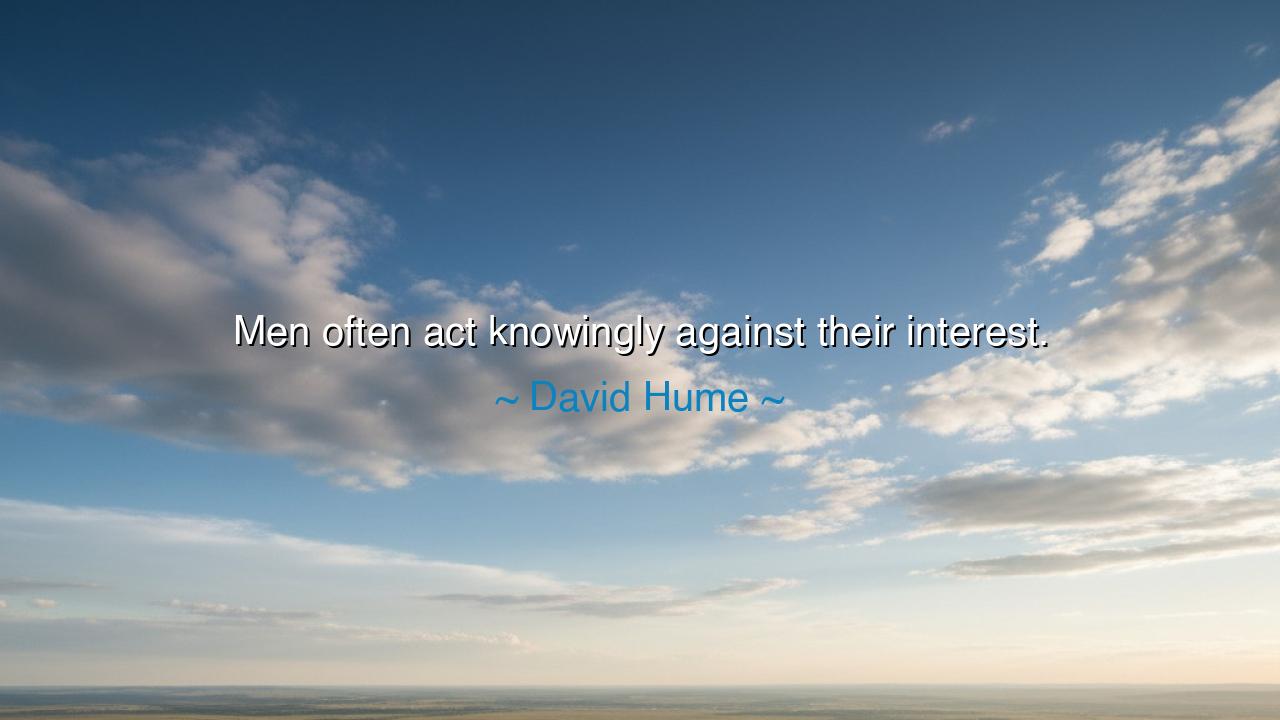
Men often act knowingly against their interest.






The words of David Hume, “Men often act knowingly against their interest,” reveal a truth as ancient as human nature itself. Hume, the great Scottish philosopher of the Enlightenment, sought to understand not only how men think, but why they so often fail to live according to their own reason. In this simple observation lies the tragedy and mystery of mankind—that we are creatures of thought, yet slaves to passion; that we can see the right path clearly, yet turn willingly toward the wrong one. His statement is not one of condemnation, but of insight—an attempt to unveil the eternal struggle between reason and desire, between knowledge and will.
Hume’s philosophy was rooted in the belief that emotion governs the mind more powerfully than logic. He wrote that “reason is, and ought only to be, the slave of the passions.” By this, he meant that no matter how much men claim to act rationally, their decisions are guided by feelings—by pride, envy, fear, or longing. To “act knowingly against one’s interest” is to surrender to these passions, to watch one’s own destruction unfold and yet feel powerless—or even unwilling—to stop it. This paradox defines the human condition. We know what will harm us, yet we reach for it; we know what will bring peace, yet we turn away. The wisdom of Hume lies in understanding that knowledge alone cannot save a man who has not mastered his heart.
History provides countless mirrors of this truth. Consider the fall of Julius Caesar, who knew the danger of ambition and the envy it breeds. He had been warned by omens, counseled by friends, and even sensed betrayal in his own dreams. Yet pride, that most seductive of passions, led him to the Senate on the Ides of March. He knew the risk, yet walked into the blades of those he called brothers. In that moment, Caesar embodied Hume’s insight perfectly: the mind may recognize peril, but the heart, driven by desire for glory, cannot turn away. Thus, knowledge without self-command becomes a curse rather than a safeguard.
The same pattern repeats across ages and lives. The drunkard who lifts the cup though he knows it poisons him; the lover who returns to a heart that has already betrayed; the ruler who wages war knowing it will destroy his people—each is a testament to the frailty of reason before the fire of impulse. Hume saw in this a deep melancholy, but also a profound opportunity: for man’s greatness lies not in erasing passion, but in learning to govern it. Reason alone is cold and sterile; passion alone is chaos. But when wisdom tempers desire, when knowledge guides action, then the human spirit achieves its highest form.
In many ways, Hume’s insight was prophetic, for it anticipated the discoveries of later ages—the recognition in psychology and neuroscience that much of human behavior is driven by forces beneath consciousness. Yet where modern science measures, Hume mourned. He saw in this tendency not merely weakness, but tragedy: that man, gifted with the light of understanding, so often chooses the darkness of folly. And yet, perhaps there is beauty even in this contradiction, for it reveals the depth of the human soul—a being torn between heaven and earth, wisdom and will, forever learning through its own mistakes.
The ancients, too, wrestled with this same truth. The philosopher Socrates taught that “to know the good is to do the good,” but life itself proved otherwise. Men may know the good, yet still pursue evil; they may know the path to virtue, yet walk into vice. Hume’s realism corrected this ancient optimism—he understood that knowing is not enough. One must cultivate the discipline of the heart, the habit of reflection, and the courage to resist the seduction of short-term pleasure. In his view, wisdom is not knowledge—it is mastery over desire.
So let this teaching be passed down: knowledge without action is emptiness, and wisdom without discipline is a dream. Do not imagine that because you know what is right, you will do it; prepare yourself to resist the voice within that whispers otherwise. The wise man is not the one who never errs, but the one who knows his own weaknesses and builds his life around guarding them. As David Hume teaches, the true victory of reason lies not in knowing what benefits us, but in choosing it even when every passion tempts us away. For in that moment of choice—when the heart bows to the mind, and the will aligns with truth—man transcends his nature and becomes something greater than flesh: he becomes a soul at peace with itself.






AAdministratorAdministrator
Welcome, honored guests. Please leave a comment, we will respond soon